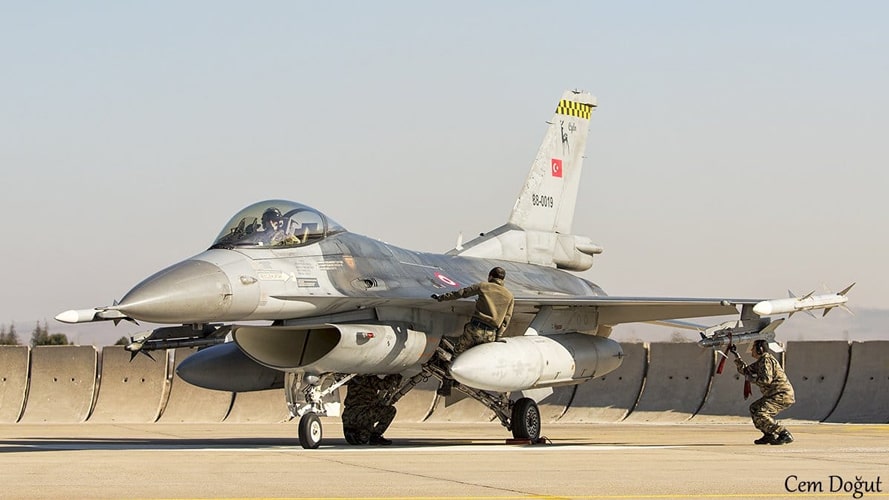It is not yet clear whether Washington will allow Ankara to acquire 40 Lockheed Martin F-16 Block 70 fighters. Turkey needs new fighters, as the Turkish Air Force’s current F-16 fleet is made up of Block 30, 40, and 50. Although, Ankara has launched a large-scale program for their renewal, to ensure and increase the combat capability of its air force, the acquisition of new aircraft is necessary.
On March 31, the new report of the Congressional Research Service came out, which provides greater clarity, because at the moment Washington does not give the green light for this sale. In a summary table of arguments, the center sets out its reasons ‘in favor of a sale’ and ‘against a sale’.
The report says that interests between Turkey and the US are increasingly diverging. Again, the negative impact of the purchase of the Russian S-400 air defense system from Turkey, as well as the increased economic ties with Russia, is emphasized. The report says that the US is expecting large orders of its latest version of the F-16, therefore the critical moment in the production of this aircraft has been overcome.
“Lockheed already anticipates orders to build 148 new F-16 Block 70/72 aircraft. Thus, a Turkish sale is not critical for either the production line or the U.S. military-industrial base,” the report said. This statement is not symbolic, but on the contrary: purposeful.
Greece has also been reported as a factor influencing the non-sale of fighter jets to Turkey. Washington sees an opportunity for Greece to increase its combat capability to the level of Turkey if they consider selling to Athens instead of Ankara. Even according to the analysis in the report, Turkey should not upgrade its air fleet to obtain a balance between the two neighboring Balkan countries.
“Because Turkey’s military, population, and economy are significantly larger than Greece, and Turkey maintains various military advantages over Greece, some Greek airpower advantages arguably help maintain regional balance, and thus should not compel an upgrade to Turkey’s F-16 fleet. The United States should reward Greece for the level of cooperation it has shown by inviting additional NATO use of its bases and territory—including to bolster Ukraine and Eastern Europe,” the report emphasizes.
But it is the neighborly relationship that may at some point help Turkey get help refurbishing its aging F-16s. For example, the report said that by building a strong Greek fleet of F-16s and potentially selling F-35s, Turkey could buy upgrades to its planes to ensure not only balance but also ease tensions between the two countries.
There are attitudes that the sale of F-16s to Turkey, or the modernization of the Turkish F-16 fleet, should happen. For example, the report said a sale would not only strengthen military-industrial cooperation but also economic cooperation. Also, Washington takes into account the fact that at some point, if Turkey does not get what it wants, Ankara may turn to Russia or China for assistance. The US does not want this, so a possible sale or modernization of the F-16 would deter such a decision.
That is why the Congressional Research Service is proposing to quickly sell fighter jets to Turkey. Analysts report a dangerous consequence: a long delay, or continued failure to give a definitive answer on the purchase of the F-16, could motivate Turkey to consider deals with foreign suppliers, possibly including Russia or China.
This also reflects joint cooperation on the NATO axis. Washington believes that one of the arguments for Turkey to receive the F-16 is precisely the future Russian threat and the possibility that at some point the Greek and Turkish air forces will cooperate.
It appears that the more Ankara needs new planes, the harder it is for Washington to make a decision. “Pros” and “Cons” are many arguments, but at some point, the US will have to be firm in its response. Because Turkish President Mr. Erdogan has repeatedly stated that not only the US produces aircraft, but also other countries.
Moreover, as long as the US remains silent, a time passes during which Turkey will be able to forget about the need for the F-16. Yes, the Turkish stealth fighter has already appeared on the runway and made the first taxiing tests. If the TF-X makes its first flight by the end of 2023, it will mean that Ankara has a working prototype. It will take a few more years, but Turkey will actually be able to start serial production of its launcher.
Once they do this, the Turks gain experience, which means they will be able to build on what has been produced or give birth to new ideas. And they are not missing. Especially in Turkey, which, despite the contradictions with Washington and technically lagging behind the Americans, managed to launch the first stealth fighter drone.
If the US does not soften its tone towards Ankara and does not take steps to improve relations [sale of F-16], it risks increasingly losing Turkey as a client in the next decade.
So, Lockheed could get an order for 148 F-16 fighter jets, but it shouldn’t lose a customer country that has one of the strongest armies in Europe and is a factor. A factor that affects politics not only in Europe and the Balkans but also in the Middle East and Asia.
Source: bulgarianmilitary.com






